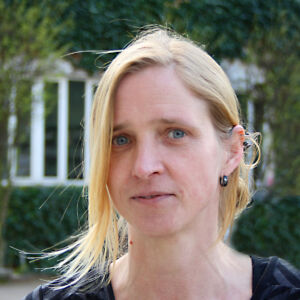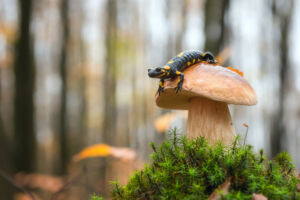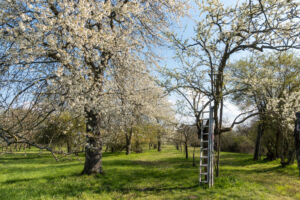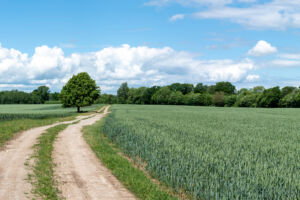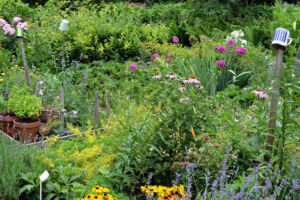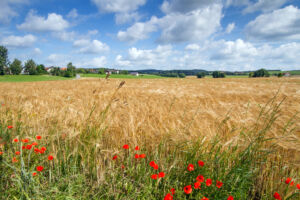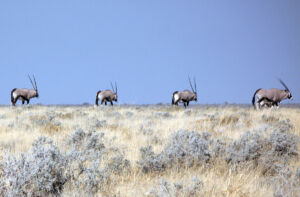

Biodiversity and People
Despite numerous efforts, the protective measures taken so far have only been partially successful because insufficient attention has been paid to the social causes of the crisis. In the Research Unit “Biodiversity and People”, we therefore focus on the question of what attitudes towards biodiversity exist and how behaviors towards its protection can be promoted.
Our research focuses on two research strands:
Indirect drivers and societal causes of biodiversity loss
To protect biodiversity, we need to better understand the indirect drivers of biodiversity loss. Other than direct drivers such as land use and pollution, indirect drivers such as values, behavior, demographic changes, and economic and political conditions have barely been researched. We therefore analyze the roles of actors, their awareness of biodiversity and their motives for action in order to identify the social-ecological causes of biodiversity loss and to enable effective change.
Conception and realignment of biodiversity protection
To stop the loss of biodiversity, a profound changes in society and politics are needed. This changes require a new awareness as well as new practices and perspectives if biodiversity protection is to be achieved. In our research, we therefore ask: How can the protection of biodiversity be better integrated into everyday life? How to reach a consensus on what kind of biodiversity is worth protecting? Here, it is important to view biodiversity and society as inseparable and to develop strategies that combine the protection and use of biodiversity.
Contact

Team
-
Dr. habil. Katja Brinkmann
![]()
Dr. habil. Katja Brinkmann
Head of the Social-Ecological Systems Hub
Go to Profile -
Apl. Prof. Dr. Diana Hummel
![]()
Apl. Prof. Dr. Diana Hummel
Coordinator for Academic Teaching and Qualification of Young Scientists
Go to Profile -
Dr. Stefan Liehr
![]()
Dr. Stefan Liehr
Member of the Executive Board, Head of the Social-Ecological Systems Hub
Go to Profile -
Dr. Alexandra Lux
![]()
Dr. Alexandra Lux
Member of the Executive Board, Head of the Knowledge Processes and Transformations Hub
Go to Profile
Projects
Publications
-
Streitfall Biodiversität. Konflikte verstehen und gestalten APuZ - Aus Politik und ZeitgeschichteStreitfall Biodiversität. Konflikte verstehen und gestalten
Diana Hummel et al.
2026 -
Growing change: Promoting insect-friendly behaviour through gardening-framed interventions Biological ConservationGrowing change: Promoting insect-friendly behaviour through gardening-framed interventions
Sarah Nieß et al.
2026 -
Pasture condition in the Mongolian steppe: Cross-validating traditional ecological knowledge and field-based ecological surveys Biological ConservationPasture condition in the Mongolian steppe: Cross-validating traditional ecological knowledge and field-based ecological surveys
Khurelpurev Oyundelger et al.
2026 -
Waldkonflikte in Zeiten des Klimawandels – Eine sozial-ökologische Analyse ISOE-Materialien Soziale ÖkologieWaldkonflikte in Zeiten des Klimawandels – Eine sozial-ökologische Analyse
Anna Brietzke et al.
2025 -
A social-ecological approach to local forest conflict analysis and shaping Forest Policy and EconomicsA social-ecological approach to local forest conflict analysis and shaping
Anna Brietzke et al.
2025 -
Most habitat's and species' assessments in German Natura 2000 sites reflect unfavourable conservation states Basic and Applied EcologyMost habitat's and species' assessments in German Natura 2000 sites reflect unfavourable conservation states
Julia S. Ellerbrok et al.
2025 -
Can vegetation breakpoints in Eastern Mongolia rangeland be detected using Sentinel-1 coherence time series data? GIScience and Remote SensingCan vegetation breakpoints in Eastern Mongolia rangeland be detected using Sentinel-1 coherence time series data?
SHUXIN JI et al.
2025 -
Konflikte um den Wald der Zukunft - Gemeinsam tragfähige Lösungen finden Konflikte um den Wald der Zukunft - Gemeinsam tragfähige Lösungen finden
Michael Kreß-Ludwig et al.
2025 -
Wissen, Werte, Wirksamkeit. Warum Biodiversitätsforschung gesellschaftliches Handlungswissen liefern muss GAIAWissen, Werte, Wirksamkeit. Warum Biodiversitätsforschung gesellschaftliches Handlungswissen liefern muss
Marion Mehring
2025 -
Big City Life. Wichtiger Lebensraum für Insekten in der Großstadt Senckenberg Natur, Forschung, MuseumBig City Life. Wichtiger Lebensraum für Insekten in der Großstadt
Marion Mehring et al.
2025 -
Trendwende zur Erhaltung der Biodiversität: Dimensionen einer sozial-ökologischen Transformation Natur und LandschaftTrendwende zur Erhaltung der Biodiversität: Dimensionen einer sozial-ökologischen Transformation
Marion Mehring et al.
2025 -
Datensatz zum Biodiversitätsbewusstsein in der Land- und Forstwirtschaft Datensatz zum Biodiversitätsbewusstsein in der Land- und Forstwirtschaft
Marion Mehring et al.
2025 -
Verhaltensintervention für insektenfreundliche Einstellungen und Verhalten Verhaltensintervention für insektenfreundliche Einstellungen und Verhalten
Sarah Nieß
2025 -
Shifting investors towards social responsibility: a narrative review of effective intervention strategies Cogent Economics & FinanceShifting investors towards social responsibility: a narrative review of effective intervention strategies
Sarah Nieß
2025 -
Landnutzung im Hainich – Ein Balanceakt zwischen Biodiversität und den Interessen lokaler Akteure Schriftenreihe Mühlhäuser BeiträgeLandnutzung im Hainich – Ein Balanceakt zwischen Biodiversität und den Interessen lokaler Akteure
Sophie Peter
2025 -
Trendanalysen gesellschaftlicher Entwicklungen als indirekte Treiber des Biodiversitätsverlusts in deutschen Kulturlandschaften ISOE-Materialien Soziale ÖkologieTrendanalysen gesellschaftlicher Entwicklungen als indirekte Treiber des Biodiversitätsverlusts in deutschen Kulturlandschaften
Sophie Peter et al.
2025 -
Social-ecological conflicts: An emancipatory conceptual approach by bringing other-than-humans into environmental conflict analysis Environment and Planning E: Nature and SpaceSocial-ecological conflicts: An emancipatory conceptual approach by bringing other-than-humans into environmental conflict analysis
Markus Rauchecker et al.
2025 -
Human-centered Academia, or AI-centered Academia? Human-centered Academia, or AI-centered Academia?
Masahiro Ryo et al.
2025 -
Towards transformative change for biodiversity: What can we learn from case studies in Germany? Journal of Environmental ManagementTowards transformative change for biodiversity: What can we learn from case studies in Germany?
Vera Schreiner et al.
2025 -
Insektenfreundliches Gärtnern in Frankfurt am Main. Eine qualitative Studie mit Gärtner*innen Insektenfreundliches Gärtnern in Frankfurt am Main. Eine qualitative Studie mit Gärtner*innen
Melina Stein, Lukas Sattlegger
2025 -
Why context matters: understanding transdisciplinary research through the lens of nine context factors Innovation: The European Journal of Social Science ResearchWhy context matters: understanding transdisciplinary research through the lens of nine context factors
Farina L. Tolksdorf et al.
2025 -
The relevance of knowledge and use of medicinal plants for health and biodiversity: a perspective from Social Ecology Discover SustainabilityThe relevance of knowledge and use of medicinal plants for health and biodiversity: a perspective from Social Ecology
Christina Trujillo Frede et al.
2025 -
10 Must-Knows aus der Biodiversitätsforschung 2024 10 Must-Knows aus der Biodiversitätsforschung 2024
Almut Arneth et al.
2024 -
Identifying the optimal landscape configuration for landscape multifunctionality Ecosystem ServicesIdentifying the optimal landscape configuration for landscape multifunctionality
Andrea Larissa Boesing et al.
2024 -
Synthese des Faktencheck Artenvielfalt. Wie können negative Trends der biologischen Vielfalt in Deutschland umgekehrt und positive Trends unterstützt werden? Faktencheck Artenvielfalt. Bestandsaufnahme und Perspektiven...Synthese des Faktencheck Artenvielfalt. Wie können negative Trends der biologischen Vielfalt in Deutschland umgekehrt und positive Trends unterstützt werden?
Helge Bruelheide et al.
2024 -
Identifying Major Factors for Success and Failure of Conservation Programs in Europe Environmental ManagementIdentifying Major Factors for Success and Failure of Conservation Programs in Europe
Nina Farwig et al.
2024 -
Farmers' satisfaction and cooperation in conflicts about river restoration in Germany. What influence have economy and participation? Journal of Rural StudiesFarmers' satisfaction and cooperation in conflicts about river restoration in Germany. What influence have economy and participation?
Thomas Fickel et al.
2024 -
Biodiversity and Ecosystem Functions in Southern African Savanna Rangelands: Threats, Impacts and Solutions Ecological StudiesBiodiversity and Ecosystem Functions in Southern African Savanna Rangelands: Threats, Impacts and Solutions
Katja Geiβler et al.
2024 -
Transformationspotenziale zum Erhalt der biologischen Vielfalt Faktencheck Artenvielfalt. Bestandsaufnahme und Perspektiven...Transformationspotenziale zum Erhalt der biologischen Vielfalt
Jennifer Hauck et al.
2024 -
Trends and Barriers to Wildlife-Based Options for Sustainable Management of Savanna Resources: The Namibian Case Ecological StudiesTrends and Barriers to Wildlife-Based Options for Sustainable Management of Savanna Resources: The Namibian Case
Morgan Hauptfleisch et al.
2024 -
Monitoring Breakpoints Under Grazing Pressure in Eastern Mongolia Monitoring Breakpoints Under Grazing Pressure in Eastern Mongolia
SHUXIN JI et al.
2024 -
Balancing competing ecosystem services requires stakeholder involvement and actions on different spatial scales Grassland Science in EuropeBalancing competing ecosystem services requires stakeholder involvement and actions on different spatial scales
Valentin H. Klaus et al.
2024 -
Agrar- und Offenland Faktencheck Artenvielfalt. Bestandsaufnahme und Perspektiven...Agrar- und Offenland
Alexandra-Maria Klein et al.
2024 -
Konflikte um den Wald der Zukunft: Wie Runde Tische und Mediation zu Lösungen beitragen ISOE Blog Soziale Ökologie. Krise - Kritik - GestaltungKonflikte um den Wald der Zukunft: Wie Runde Tische und Mediation zu Lösungen beitragen
Michael Kreß-Ludwig
2024 -
Indirekte Treiber der Biodiversitätsentwicklung Faktencheck Artenvielfalt. Bestandsaufnahme und Perspektiven...Indirekte Treiber der Biodiversitätsentwicklung
Sebastian Lakner et al.
2024 -
Konflikte um den Wald der Zukunft: "Wir fördern den konstruktiven Dialog" ISOE Blog Soziale Ökologie. Krise - Kritik - GestaltungKonflikte um den Wald der Zukunft: "Wir fördern den konstruktiven Dialog"
Deike Lüdtke, Anna Brietzke
2024 -
Lessons Learned from a North-South Science Partnership for Sustainable Development Ecological StudiesLessons Learned from a North-South Science Partnership for Sustainable Development
Robert Lütkemeier et al.
2024 -
Multiple ways to bend the curve of biodiversity loss: An analytical framework to support transformative change People and NatureMultiple ways to bend the curve of biodiversity loss: An analytical framework to support transformative change
Marion Mehring et al.
2024 -
Von Menschen und Sechsbeinern Der PalmenGartenVon Menschen und Sechsbeinern
Marion Mehring, Pia Ditscher, Melina Stein
2024 -
The role of traditional ecological knowledge, given the transformation of pastoralism in Central and Eastern Mongolia AmbioThe role of traditional ecological knowledge, given the transformation of pastoralism in Central and Eastern Mongolia
Sophie Peter et al.
2024 -
Navigating the science policy interface: a co-created mind-map to support early career research contributions to policy-relevant evidence Environmental EvidenceNavigating the science policy interface: a co-created mind-map to support early career research contributions to policy-relevant evidence
Carla-Leanne Washbourne et al.
2024 -
Farmers` agonistic conflict frames regarding river restoration disputes Agriculture and Human ValuesFarmers` agonistic conflict frames regarding river restoration disputes
Thomas Fickel
2023 -
"Connecting people to nature" - Eine kritische Diskussion der Citizen-Science-App "iNaturalist" als Medium einer bestimmten Betrachtung und Vermittlung von Natur ISOE-Diskussionspapiere"Connecting people to nature" - Eine kritische Diskussion der Citizen-Science-App "iNaturalist" als Medium einer bestimmten Betrachtung und Vermittlung von Natur
Pirmin Kuß, Florian Dirk Schneider
2023 -
A Qualitative Exploration of Conflicts in Human-Wildlife Interactions in Namibia's Kunene Region DiversityA Qualitative Exploration of Conflicts in Human-Wildlife Interactions in Namibia's Kunene Region
Robert Lütkemeier et al.
2023 -
RNA interference to combat the Asian tiger mosquito in Europe: A pathway from design of an innovative vector control tool to its application Biotechnology AdvancesRNA interference to combat the Asian tiger mosquito in Europe: A pathway from design of an innovative vector control tool to its application
Ruth Müller et al.
2023 -
Landscape management strategies for multifunctionality and social equity nature sustainabilityLandscape management strategies for multifunctionality and social equity
Margot Neyret et al.
2023 -
Go-Along-Interviews als Methode für eine sozial-ökologische Stadtnaturforschung Forum Qualitative Sozialforschung / Forum: Qualitative Socia...Go-Along-Interviews als Methode für eine sozial-ökologische Stadtnaturforschung
Lukas Sattlegger et al.
2023 -
Der Garten, die Insekten und wir - Gärtner*innentypen im Vergleich ISOE Blog Soziale Ökologie. Krise - Kritik - GestaltungDer Garten, die Insekten und wir - Gärtner*innentypen im Vergleich
Lukas Sattlegger, Melina Stein, Johanna Freudenberg
2023 -
Insektenfreundliches Gärtnern bei verschiedenen Typen von Gärtner*innen. Eine sozialwissenschaftliche und linguistische Analyse ISOE-Materialien Soziale ÖkologieInsektenfreundliches Gärtnern bei verschiedenen Typen von Gärtner*innen. Eine sozialwissenschaftliche und linguistische Analyse
Melina Stein, Lukas Sattlegger, Johanna Freudenberg
2023 -
In search of a nomadic pastoralism for the 21st century. A transdisciplinary development of future scenarios to foster a social-ecological transformation in Mongolia Innovation: The European Journal of Social Science ResearchIn search of a nomadic pastoralism for the 21st century. A transdisciplinary development of future scenarios to foster a social-ecological transformation in Mongolia
Lukas Drees et al.
2022 -
Konflikte im Bereich Biodiversität. Normative Aspekte der sozial-ökologischen Forschung Ökologisches WirtschaftenKonflikte im Bereich Biodiversität. Normative Aspekte der sozial-ökologischen Forschung
Diana Hummel et al.
2022 -
Exploring complementarity among interdependent pastoral institutions in Mongolia Sustainability ScienceExploring complementarity among interdependent pastoral institutions in Mongolia
Ulan Kasymov et al.
2022 -
How to reach people through knowledge transfer - Sustainability and conservation research: addressing Namibian land users ISOE Policy BriefHow to reach people through knowledge transfer - Sustainability and conservation research: addressing Namibian land users
Deike Lüdtke et al.
2022 -
Avoiding pitfalls in knowledge transfer. A guide using the example of communication with Namibian land users ISOE Blog Soziale Ökologie. Krise - Kritik - GestaltungAvoiding pitfalls in knowledge transfer. A guide using the example of communication with Namibian land users
Deike Lüdtke et al.
2022 -
Methods for Transdisciplinary Integration - Lessons Learned from Case Studies in Different Cultural Contexts Discussion PaperMethods for Transdisciplinary Integration - Lessons Learned from Case Studies in Different Cultural Contexts
Marion Mehring
2022 -
Rural to urban migration in Mongolia - Social-ecological conditions for a stepwise process ISOE-DiskussionspapiereRural to urban migration in Mongolia - Social-ecological conditions for a stepwise process
Anika Tarne et al.
2022 -
News selection and framing: the media as a stakeholder in human-carnivore coexistence Environmental Research LettersNews selection and framing: the media as a stakeholder in human-carnivore coexistence
Ugo Arbieu et al.
2021 -
Restart of fieldwork after COVID-19 break: first impressions from a Master-Tandem in ORYCS SPACES II NewsletterRestart of fieldwork after COVID-19 break: first impressions from a Master-Tandem in ORYCS
Alice Cimenti, Manjana Tausendfreund
2021 -
The nexus between climate change, migration and gender Gender, Climate Change and Livelihoods. Vulnerabilities and ...The nexus between climate change, migration and gender
Diana Hummel
2021 -
Finished ORYCS master's thesis: Landscape permeability for elephant movement SPACES II NewsletterFinished ORYCS master's thesis: Landscape permeability for elephant movement
Ronja Kraus et al.
2021 -
Stakeholder Attitudes towards Wildlife-Based Land Use in Namibia's Kunene Region IGC-IRC2021 ProceedingsStakeholder Attitudes towards Wildlife-Based Land Use in Namibia's Kunene Region
Robert Lütkemeier et al.
2021 -
Water security and rangeland sustainability: Transdisciplinary research insights from Namibian-German collaborations South African Journal of ScienceWater security and rangeland sustainability: Transdisciplinary research insights from Namibian-German collaborations
Robert Lütkemeier, Meed Mbidzo, Stefan Liehr
2021 -
Urban Social Ecology Cities and NatureUrban Social Ecology
Marion Mehring et al.
2021 -
Biodiversität im Anthropozän. Ein sozial-ökologischer Ansatz zur Bewertung von Biodiversität Ökologisches WirtschaftenBiodiversität im Anthropozän. Ein sozial-ökologischer Ansatz zur Bewertung von Biodiversität
Marion Mehring, Diana Hummel, Florian Dirk Schneider
2021 -
Cultural worldviews consistently explain bundles of ecosystem service prioritisation across rural Germany People and NatureCultural worldviews consistently explain bundles of ecosystem service prioritisation across rural Germany
Sophie Peter et al.
2021 -
Biodiversity conservation as infectious disease prevention: why a social-ecological perspective is essential Global SustainabilityBiodiversity conservation as infectious disease prevention: why a social-ecological perspective is essential
Florian Dirk Schneider et al.
2021 -
The positive experience of encountering wolves in the wild Conservation Science and PracticeThe positive experience of encountering wolves in the wild
Ugo Arbieu et al.
2020 -
Biodiversitätskonflikte. Eine sozial-ökologische Perspektive W & F Wissenschaft und FriedenBiodiversitätskonflikte. Eine sozial-ökologische Perspektive
Thomas Fickel, Robert Lütkemeier, Diana Hummel
2020 -
Stakeholder attitudes on wildlife in Namibia's Kunene Region SPACES II NewsletterStakeholder attitudes on wildlife in Namibia's Kunene Region
Ronja Kraus et al.
2020 -
Approaching the interaction between society and wildlife SPACES II NewsletterApproaching the interaction between society and wildlife
Ronja Kraus et al.
2020 -
ORYCS Master tandem on Elephant movements SPACES II NewsletterORYCS Master tandem on Elephant movements
Ronja Kraus, Ivonne Makando
2020 -
Mobility at risk: Sustaining the Mongolian steppe ecosystem - developing a vision ISOE-Materialien Soziale ÖkologieMobility at risk: Sustaining the Mongolian steppe ecosystem - developing a vision
Denise Margaret S. Matias et al.
2020 -
Anthropocene Biodiversity Challenges. Über die Notwendigkeit einer sozial-ökologischen Biodiversitätsforschung Senckenberg Natur, Forschung, MuseumAnthropocene Biodiversity Challenges. Über die Notwendigkeit einer sozial-ökologischen Biodiversitätsforschung
Marion Mehring, Alexandra Lux, Thomas Jahn
2020 -
A systematic review of biodiversity and demographic change: A misinterpreted relationship? AmbioA systematic review of biodiversity and demographic change: A misinterpreted relationship?
Marion Mehring et al.
2020 -
Gut vorbereitet. Wie Senckenberg und Partner umweltfreundliche Bekämpfungsmethoden gegen Stechmücken testen Natur Forschung MuseumGut vorbereitet. Wie Senckenberg und Partner umweltfreundliche Bekämpfungsmethoden gegen Stechmücken testen
Marion Mehring et al.
2020 -
Knowledge on exotic mosquitoes in Germany, and public acceptance and effectiveness of Bti and two self-prepared insecticides against Aedes japonicus japonicus scientific reportsKnowledge on exotic mosquitoes in Germany, and public acceptance and effectiveness of Bti and two self-prepared insecticides against Aedes japonicus japonicus
Friederike Reuß et al.
2020 -
Sozial-ökologische Analyse von Biodiversitätskonflikten. Ein Forschungskonzept ISOE-Materialien Soziale ÖkologieSozial-ökologische Analyse von Biodiversitätskonflikten. Ein Forschungskonzept
Thomas Fickel, Diana Hummel
2019 -
On the Move. Mobilität und sozial-ökologische Transformationen im westafrikanischen Sahel und in der Mongolei Natur Forschung MuseumOn the Move. Mobilität und sozial-ökologische Transformationen im westafrikanischen Sahel und in der Mongolei
Diana Hummel, Marion Mehring
2019 -
First assessment of perspectives on wildlife management SPACES II NewsletterFirst assessment of perspectives on wildlife management
Robert Lütkemeier et al.
2019 -
Invited background document on biodiversity and health for the Global Sustainable Development Report 2019 drafted by the Independent Group of Scientists NINA ReportInvited background document on biodiversity and health for the Global Sustainable Development Report 2019 drafted by the Independent Group of Scientists
Jiska van Dijk et al.
2019 -
Keep on moving - How to facilitate nomadic pastoralism in Mongolia in the light of current societal transformation processes ISOE Policy BriefKeep on moving - How to facilitate nomadic pastoralism in Mongolia in the light of current societal transformation processes
Marion Mehring et al.
2018 -
Mobility at risk: Sustaining the Mongolian Steppe Ecosystem - societal transformation processes. Stakeholder analysis and identification of drivers and potential solution pathways ISOE-Materialien Soziale ÖkologieMobility at risk: Sustaining the Mongolian Steppe Ecosystem - societal transformation processes. Stakeholder analysis and identification of drivers and potential solution pathways
Marion Mehring et al.
2018 -
EKLIPSE: engaging knowledge holders and networks for evidence-informed European policy on biodiversity and ecosystem services Evidence & PolicyEKLIPSE: engaging knowledge holders and networks for evidence-informed European policy on biodiversity and ecosystem services
Allan Watt et al.
2018 -
Climate change, land degradation and migration in Mali and Senegal - some policy implications Migration and DevelopmentClimate change, land degradation and migration in Mali and Senegal - some policy implications
Diana Hummel
2016 -
Migration as Societal Response to Climate Change and Land Degradation in Mali and Senegal Adaptation to Climate Change and Variability in Rural West A...Migration as Societal Response to Climate Change and Land Degradation in Mali and Senegal
Stefan Liehr, Lukas Drees, Diana Hummel
2016 -
Using Bayesian belief networks to analyse social-ecological conditions for migration in the Sahel Global Environmental ChangeUsing Bayesian belief networks to analyse social-ecological conditions for migration in the Sahel
Lukas Drees, Stefan Liehr
2015 -
Climate change, environment and migration in the Sahel Rural 21Climate change, environment and migration in the Sahel
Diana Hummel
2015 -
Social-ecological conditions of migration in the Sahel micle policy paperSocial-ecological conditions of migration in the Sahel
Diana Hummel
2014

